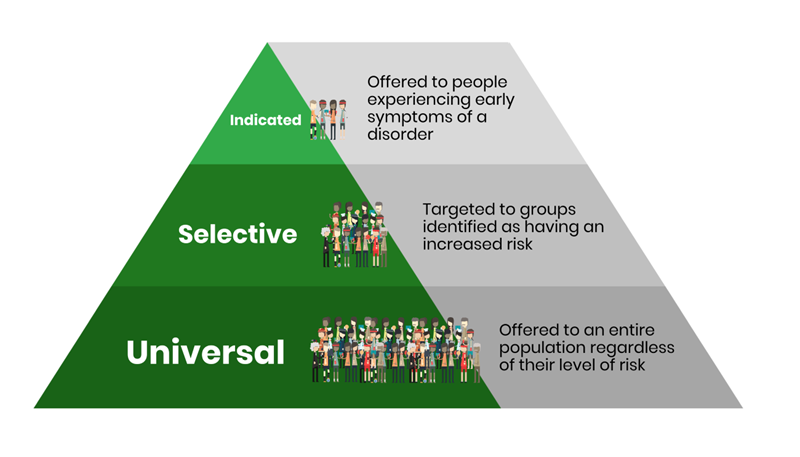Importance of drug and alcohol prevention
The harms associated with drugs and alcohol, including accidents, injury and violence, are particularly high for young people. Drugs and alcohol can also interfere with the developing adolescent brain. Therefore, the National Health and Medical Research Council advises that for young people under the age of 15, it is particularly important that they do not consume alcohol. For 15-17-year-olds the safest option is to delay the consumption of alcohol for as long as possible.
7.9% of young Australians meet criteria for a substance use disorder in the past 12 months.
Problems with alcohol and other drug use often begin during adolescence and research shows that the earlier a young person starts to use drugs and alcohol, the more likely they will experience various negative outcomes. These include poor school performance and early drop out, an increased risk of other mental health problems, dependency on substances (i.e. addiction), and an increased likelihood of juvenile offending. This highlights the need for effective prevention in adolescence to protect young people from these associated harms.
There are several influences that have shown to increase risk for, or protect against, adolescent drug use.
Risk factors for adolescent drug and alcohol use include:
- Drug use or approval by parents or peers
- Disengagement with school
- Poor family communication and bonding.
Factors that protect against adolescent drug and alcohol use include:
- Time spent with peers who do not use drugs or alcohol
- A sense of self-efficacy (i.e. confidence in own abilities)
- Parental rule setting and monitoring
- Family bonding and communication.
The good news is that effective prevention can have significant benefits. Many of these risk and protective factors are modifiable, and provide important targets for prevention strategies. The field of substance use prevention identifies three types of prevention, namely, indicated, selective and universal.
The figure below explains the three types of prevention.


Timing of drug and alcohol preventionIt is important that young people receive drug and alcohol education prior to the peak risk phase during adolescence when experimentation with alcohol or drugs can occur. The benefits of equipping students with these skills and information in advance is that they will know how to make informed decisions and stay safe in situations involving alcohol and other drug use.
For each year we can delay the use of alcohol for a young person, the odds of developing alcohol dependence are significantly reduced.
Evidence BaseThis factsheet was developed following expert review by researchers at the Matilda Centre for Research in Mental Health and Substance Use at the University of Sydney, the National Drug & Alcohol Research Centre at the University of New South Wales, and the National Drug Research Institute at Curtin University.
- Slade T, Vescovi J, Chapman C, et al. The epidemiology of mental and substance use disorders in Australia 2020–22: Prevalence, socio-demographic correlates, severity, impairment and changes over time. Australian & New Zealand Journal of Psychiatry. 2024;59(6):510-521. doi:10.1177/00048674241275892